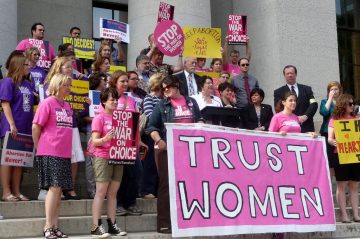
In the US, abortion is a hugely controversial and divisive topic. Ever since the Roe vs Wade Supreme Court ruling that legalized abortion in 1973, there has always been a vocal anti-abortion minority that strongly opposes abortion for a variety of reasons. Anti-abortion advocates occasionally rise to the forefront against pro-abortion advocates, especially when the Supreme Court leans conservative. (Note: the politically biased terms “pro-life” and “pro-choice” have been avoided in this article.)
A new ban of abortions after the sixth week of pregnancy in several states has become a temporary threat to pregnant women in Louisiana, Georgia, Kentucky, Mississippi, Iowa, North Dakota, and Ohio. This “heartbeat” bill, which recently became law in these states, bans women from getting an abortion after six weeks of pregnancy, including in rape and incest cases, which is around the period at which doctors can first detect a heartbeat from the fetus. Nevertheless, most women do not realize they are pregnant after only six weeks.
More drastically, Alabama has already declared abortions to be felonies, allowing zero exceptions at any stage of the pregnancy. In the law, Governor Ivey wrote a statement against abortion “as a powerful testament to Alabamians’ deeply held belief that every life is precious, that every life is a sacred gift from God.” Overall, around 20 countries have proposed a restriction on abortion in 2019. The abortion ban challenges and hopes to overthrow Roe vs. Wade. Although this ban is a threat, it is unconstitutional based on the supreme court precedent.
The pro-abortion side has debated that a woman has the right of choice in their pregnancy, while the conservative states and anti-abortion advocates have argued that the existence of a baby’s heartbeat meant that life is present. Regarding the growing debate, pro-abortion campaigners have protested the abortion ban around the country and are pushing for a decision in the Supreme Court. Potentially undermining their efforts, President Donald Trump has appointed two conservative justices to the Supreme Court in the middle of May, tipping the odds in the anti-abortion activists’ favor.
Regarding this issue, freshman Jasmine Y. explained her thoughts on abortion, saying, “Abortion is a type of murder and it’s bad for the woman’s body. Abortion also brings many negative effects to the woman and society. I believe that life is the most important factor.” Another pro-life advocate, who has decided to remain anonymous, expressed their outlook on the debate. “I believe that when aborting a life that has a heartbeat and developing brain activity, you are taking a life. That is murder. Every life is a life, no matter how ‘functional’ you are. Someone with a disability could arguably be as non-functional as a baby, but we don’t have the right to kill him or her.”
AISG counselor Ms. Brown provided her opinion and idea on the other side of the issue — pro-choice. She says, “The woman needs to make the decision. [It is] her choice and her body.” This is a viewpoint that many pro-abortion advocates share, as they believe that the final decision should be made by the person who carries the baby.
Since each side has delivered a strong stance to support their argument, I respect both sides of the abortion debate. However, I believe that women—not the law—should have control over their own bodies. Personally, I think that the argument about “murdering” a fetus is strange since the baby is not born yet and there is no distinct line between life and death in these situations. Feel free to comment with your ideas about the abortion debate below.
For more information, see CBS News, NBC News, Planned Parenthood Action, Marie Claire, NY Times, NY Times, Vox, ABC, and Time.
One thought on “Pro-Choice or Pro-Life?”
Sorry, comments are closed.